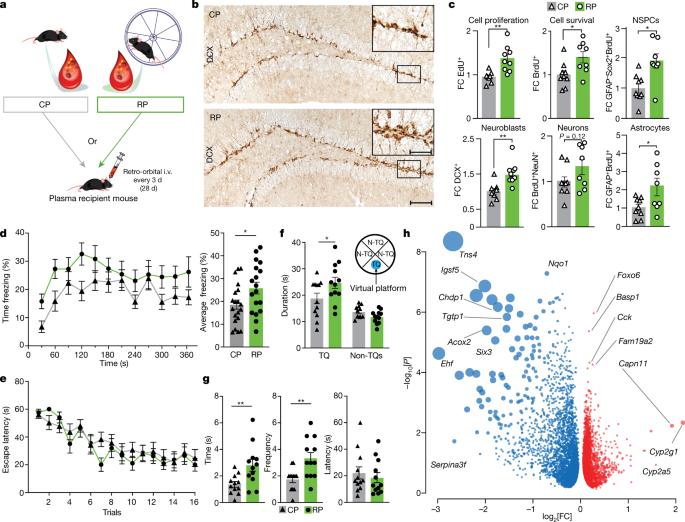Exercise plasma boosts memory and dampens brain inflammation via clusterin
IF 50.5
1区 综合性期刊
Q1 MULTIDISCIPLINARY SCIENCES
引用次数: 70
Abstract
Physical exercise is generally beneficial to all aspects of human and animal health, slowing cognitive ageing and neurodegeneration1. The cognitive benefits of physical exercise are tied to an increased plasticity and reduced inflammation within the hippocampus2–4, yet little is known about the factors and mechanisms that mediate these effects. Here we show that ‘runner plasma’, collected from voluntarily running mice and infused into sedentary mice, reduces baseline neuroinflammatory gene expression and experimentally induced brain inflammation. Plasma proteomic analysis revealed a concerted increase in complement cascade inhibitors including clusterin (CLU). Intravenously injected CLU binds to brain endothelial cells and reduces neuroinflammatory gene expression in a mouse model of acute brain inflammation and a mouse model of Alzheimer’s disease. Patients with cognitive impairment who participated in structured exercise for 6 months had higher plasma levels of CLU. These findings demonstrate the existence of anti-inflammatory exercise factors that are transferrable, target the cerebrovasculature and benefit the brain, and are present in humans who engage in exercise. Plasma from voluntarily running mice reduces baseline expression of neuroinflammatory genes and experimentally induced brain inflammation when infused into sedentary mice.

运动血浆通过集束蛋白增强记忆力并抑制脑部炎症
体育锻炼通常对人类和动物健康的各个方面都有益处,可延缓认知老化和神经退化1。体育锻炼对认知的益处与海马内可塑性的增强和炎症的减少有关2-4,但人们对介导这些效应的因素和机制知之甚少。在这里,我们展示了从自愿跑步的小鼠体内收集并注入久坐小鼠体内的 "跑步者血浆 "能降低基线神经炎症基因表达和实验诱导的脑部炎症。血浆蛋白质组学分析表明,补体级联抑制剂(包括集簇素(CLU))会协同增加。在急性脑部炎症小鼠模型和阿尔茨海默病小鼠模型中,静脉注射的 CLU 能与脑内皮细胞结合并减少神经炎症基因的表达。参加6个月有组织运动的认知障碍患者血浆中的CLU水平较高。这些研究结果表明,抗炎运动因子是可转移的,以脑血管为靶点,对大脑有益,而且存在于参与运动的人群中。将自愿跑步小鼠的血浆注入久坐小鼠体内,可降低神经炎症基因的基线表达和实验诱导的脑部炎症。
本文章由计算机程序翻译,如有差异,请以英文原文为准。
求助全文
约1分钟内获得全文
求助全文
来源期刊

Nature
综合性期刊-综合性期刊
CiteScore
90.00
自引率
1.20%
发文量
3652
审稿时长
3 months
期刊介绍:
Nature is a prestigious international journal that publishes peer-reviewed research in various scientific and technological fields. The selection of articles is based on criteria such as originality, importance, interdisciplinary relevance, timeliness, accessibility, elegance, and surprising conclusions. In addition to showcasing significant scientific advances, Nature delivers rapid, authoritative, insightful news, and interpretation of current and upcoming trends impacting science, scientists, and the broader public. The journal serves a dual purpose: firstly, to promptly share noteworthy scientific advances and foster discussions among scientists, and secondly, to ensure the swift dissemination of scientific results globally, emphasizing their significance for knowledge, culture, and daily life.
 求助内容:
求助内容: 应助结果提醒方式:
应助结果提醒方式:


